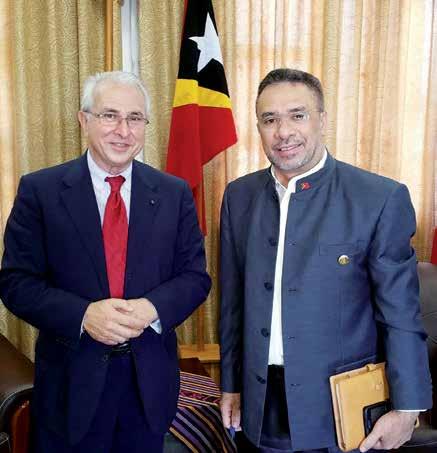
4 minute read
Humanitarian Diplomacy
Michelle Rees looks at how the Sovereign Order of Malta acts to serve the poor, sick and victims of conflicts in neutral, impartial and apolitical ways.
The Sovereign Order of Malta has many features that make it unique, and one of the most surprising attributes is its sovereign status. This is significant given it has retained sovereignty with a limited territorial base – Rhodes in 1310 and then Malta until 1798 – but with an influence inversely proportional to the size of its rights-of-way.
The Order of Malta has experienced a marked intensification of diplomatic relations in recent years, however the relevance, need and purpose of these relations are not well understood.
Humanitarian aid is no longer just a matter of last-minute emergency rescuers. Operational means alone, such as logistics and resources for the delivery of aid, are no longer sufficient to ensure the long-term success of humanitarian action. Humanitarian diplomacy is an invaluable tool for mediation, peace and reconstruction.
The Order of Malta’s diplomatic relations
Today, the Sovereign Order of Malta has bilateral diplomatic relations with 110 states and the European Union. It also has permanent observer status at the United Nations, its specialised agencies, and the main international organisations.
The diplomatic activity of the Sovereign Order of Malta is distinct from that of nation states. It has another dimension and other aims. Having no longer a territory to defend, economic or trade interests to promote, the Order of Malta does not position itself in international conflicts. Instead, it acts to promote ethical and spiritual values, which have guided it for nearly a thousand years through its charitable works, especially in the medical, social and humanitarian fields, and in emergency situations. It does not pursue any economic or political goal and does not depend on any other state or government. It is always neutral, impartial and apolitical.
The scope of its diplomatic relations
The humanitarian activities of the Order of Malta around the world are largely facilitated by the existence of its diplomatic network, which strengthens the relationships with the governments of the

countries in which it operates.
Diplomatic relations offer direct access to national governments and international organisations. They provide a channel which helps the entities of the Order in developing medical and humanitarian projects in accordance with local needs. The Order’s sovereignty, together with its diplomatic network, plays a pivotal role in the Order’s ability to help people in need, creating an asset for the Catholic Church and for the countries where it operates. The Order is neutral and impartial, which allows it to provide assistance in situations where other organisations have difficulty of access. Thanks to international cooperation agreements signed between more than 50 states and the government of the Sovereign Order of Malta, the organisations of the Order on the ground have an operating framework that favours the efficacy and the durability of its actions. This allows it to be integrated into national and regional healthcare systems and to obtain customs facilities for the importing of essential healthcare equipment. In these relations, the Order and the states are equals. The Order is always recognised and defined as “Sovereign”. The agreements stipulated take the form of international accords, although the Order is a non-territorial power.
Moreover, the diplomatic relations offer stronger protection for humanitarian personnel on the field in crisis regions.
Humanitarian diplomacy in the Asia Pacific Region
The Order of Malta has a presence across Asia Pacific where a range of projects improve healthcare and living conditions for many thousands of people. In addition, the Order’s national associations and Malteser International are at the ready to respond to natural and man-made disasters and implement extensive programs in disaster risk reduction throughout the region.
Countries the Order of Malta has diplomatic relations within the Asia and Oceania include Afghanistan, Armenia, Cambodia, Georgia, Jordan, Kazakhstan, Kiribati, Lebanon, Marshall Islands, Micronesia, Nauru, Philippines, Tajikistan, Thailand, Timor-Leste, Kiribati and Turkmenistan.

Myanmar – an example of Diplomacy in action
Malteser International has been allowed to operate in Myanmar since 2001. Because of the Order of Malta’s diplomatic relations and status as a neutral, apolitical and independent institution, it enabled access where other foreign relief organisation have been denied. Consequently, when cyclone Nargis hit the country in 2008, Malteser International was one of the very few international organisations able to start an immediate relief operation whereby it channelled international aid into affected regions.
Malteser International now employs more than 350 local staff in Rakhine, Shan and Kayin states operating in primary health care, WASH, Disaster Risk Reduction programs, climate change adaptation and post disaster relief. Another focus is health care for displaced people (the Rohingya) who have fled from Myanmar to Thailand and Bangladesh, where they do not have refugee status and are therefore not eligible for medical care.
Left: The Grand Chancellor of the Sovereign Order of Malta, Albrecht Freiherr von Boeselager, speaks at the United Nations Security Council in November 2009. Top left: The Ambassador and Permanent Representative of the Sovereign Order of Malta to the United Nations in New York, Paul Beresford-Hill, presents his credentials to Antonio Guterres, Secretary General of the UN in August 2019. Top right: H.E. David Scarf with Hernani Coelho, the Timor-Leste Foreign Minister at that time.
ORDER OF MALTA DIPLOMATS IN THE ASIA PACIFIC REGION INCLUDE:
• H.E. Jim Dominguez – Ambassador-at-Large to South-East Asia and the Far East • H.E. Michael Mann – Ambassador to Thailand and Cambodia • H.E. Fabrizio Bozzato – Ambassador to the Republic of Nauru • H.E. Terry Tobin – Ambassador-Designate to Timor-Leste • H.E. David Scarf – Ambassador-at-Large to Oceania • Frank Zipfinger – Counsellor of the Embassy to the Kingdom of Cambodia.










